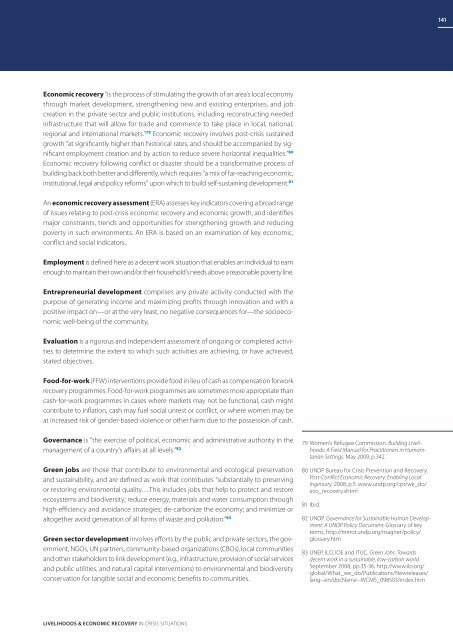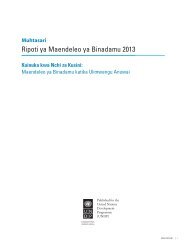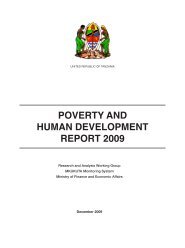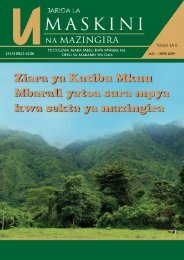Download PDF (4.08 MB) - ReliefWeb
Download PDF (4.08 MB) - ReliefWeb
Download PDF (4.08 MB) - ReliefWeb
You also want an ePaper? Increase the reach of your titles
YUMPU automatically turns print PDFs into web optimized ePapers that Google loves.
141<br />
Economic recovery “is the process of stimulating the growth of an area’s local economy<br />
through market development, strengthening new and existing enterprises, and job<br />
creation in the private sector and public institutions, including reconstructing needed<br />
infrastructure that will allow for trade and commerce to take place in local, national,<br />
regional and international markets.” 79 Economic recovery involves post-crisis sustained<br />
growth “at significantly higher than historical rates, and should be accompanied by significant<br />
employment creation and by action to reduce severe horizontal inequalities.” 80<br />
Economic recovery following conflict or disaster should be a transformative process of<br />
building back both better and differently, which requires “a mix of far-reaching economic,<br />
institutional, legal and policy reforms” upon which to build self-sustaining development. 81<br />
An economic recovery assessment (ERA) assesses key indicators covering a broad range<br />
of issues relating to post-crisis economic recovery and economic growth, and identifies<br />
major constraints, trends and opportunities for strengthening growth and reducing<br />
poverty in such environments. An ERA is based on an examination of key economic,<br />
conflict and social indicators.<br />
Employment is defined here as a decent work situation that enables an individual to earn<br />
enough to maintain their own and/or their household’s needs above a reasonable poverty line.<br />
Entrepreneurial development comprises any private activity conducted with the<br />
purpose of generating income and maximizing profits through innovation and with a<br />
positive impact on—or at the very least, no negative consequences for—the socioeconomic<br />
well-being of the community.<br />
Evaluation is a rigorous and independent assessment of ongoing or completed activities<br />
to determine the extent to which such activities are achieving, or have achieved,<br />
stated objectives.<br />
Food-for-work (FFW) interventions provide food in lieu of cash as compensation forwork<br />
recovery programmes. Food-for-work programmes are sometimes more appropriate than<br />
cash-for-work programmes in cases where markets may not be functional, cash might<br />
contribute to inflation, cash may fuel social unrest or conflict, or where women may be<br />
at increased risk of gender-based violence or other harm due to the possession of cash.<br />
Governance is “the exercise of political, economic and administrative authority in the<br />
management of a country’s affairs at all levels.” 82<br />
Green jobs are those that contribute to environmental and ecological preservation<br />
and sustainability, and are defined as work that contributes “substantially to preserving<br />
or restoring environmental quality….This includes jobs that help to protect and restore<br />
ecosystems and biodiversity; reduce energy, materials and water consumption through<br />
high-efficiency and avoidance strategies; de-carbonize the economy; and minimize or<br />
altogether avoid generation of all forms of waste and pollution.” 83<br />
Green sector development involves efforts by the public and private sectors, the government,<br />
NGOs, UN partners, community-based organizations (CBOs), local communities<br />
and other stakeholders to link development (e.g., infrastructure, provision of social services<br />
and public utilities, and natural capital interventions) to environmental and biodiversity<br />
conservation for tangible social and economic benefits to communities.<br />
79 Women’s Refugee Commission. Building Livelihoods:<br />
A Field Manual for Practitioners in Humanitarian<br />
Settings. May 2009, p.342.<br />
80 UNDP Bureau for Crisis Prevention and Recovery.<br />
Post-Conflict Economic Recovery: Enabling Local<br />
Ingenuity. 2008, p.5. www.undp.org/cpr/we_do/<br />
eco_recovery.shtml<br />
81 Ibid.<br />
82 UNDP. Governance for Sustainable Human Development:<br />
A UNDP Policy Document. Glossary of key<br />
terms, http://mirror.undp.org/magnet/policy/<br />
glossary.htm<br />
83 UNEP, ILO, IOE and ITUC. Green Jobs: Towards<br />
decent work in a sustainable, low-carbon world.<br />
September 2008, pp.35-36. http://www.ilo.org/<br />
global/What_we_do/Publications/Newreleases/<br />
lang--en/docName--WCMS_098503/index.htm<br />
Livelihoods & Economic Recovery in Crisis Situations





